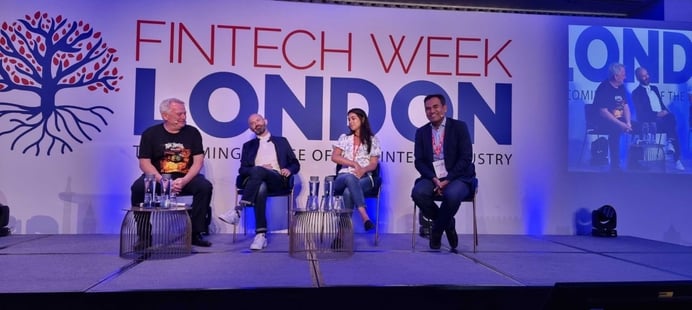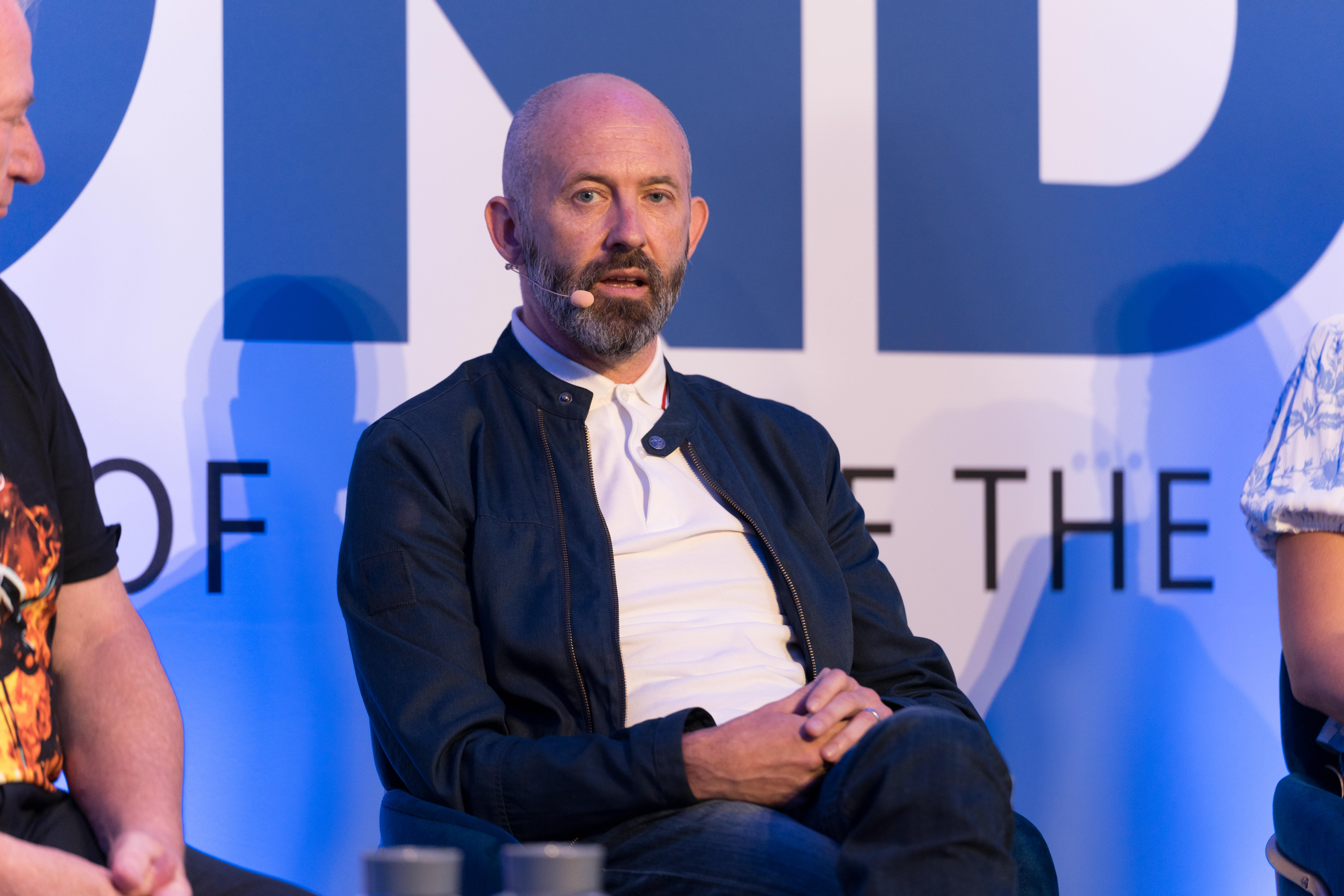Coopetition between Big Banks and Big Tech
Earlier this week, we attended Fintech Week London's flagship conference at etc. Venues. The event, running 11 - 12 July was packed with Fintech and Big Tech leaders alike who are paving the way for the evolution of the Fintech industry.
During day two of the event, our CEO and Founder, Mark Hartley joined Rita Martins - Head of Fintech Partnerships at HSBC and Ronit Ghose - Global Head of Banking, Fintech and Digital Assets, Citi, to discuss the coopetition between Big Tech and Big Banks (moderated by Chris Skinner).
"Why can't the fintech industry, and other big techs in the financial services industry, start helping with near-term problems that actually help businesses, and therefore, consumers get through what is undoubtedly going to be a pretty difficult period of the next couple of years?" - Mark Hartley | CEO at BankiFi
 Source: LinkedIn/@TheFintechTimes
Source: LinkedIn/@TheFintechTimes
Insight: What coopetition really looks like, the future of fintech and the value this holds for small businesses
Q: How has the Banking industry evolved to cooperate with technology firms over time and how has this added value to their business customers?
'"I always talk about 3 phases when it comes to the evolution of the fintech industry and the relationships – or coopetition – between banks and fintech’s alike. The fintech industry was created in the early 2010’s, however it was created on a naivety that banks were arrogant and slow by nature. There was a perspective amongst new fintech’s during these early stages of: ‘We can do banking without banks.’ What the industry didn’t realise, was the amount of heavy regulation and the sheer amount of compliance that there was. There were – and still are – quite a lot of barriers, and rightly so! We’re talking about matters of protecting people’s money, making sure that fraud doesn’t happen, anti-money laundering – all these things that I don’t believe the industry really understood at this point. This phase is what I describe as fintech 1.0, where people would think that they could come in and begin to do things that banks have been doing for 300 years.
Then you have the, what I describe as fintech 2.0, which is where banks projected a bit of backlash towards fintech’s. Banks had the opinion that all fintech’s were doing was developing a better digital experience for the customer. Ultimately, fintech’s weren’t doing the things that banks were doing; they’re not looking after peoples’ money, doing payments etc. There was a feeling during this phase for banks that they could do all the things that fintech’s were doing and now I believe we have reached a fintech 3.0 phase whereby a realisation has occurred that the best possible solution for the customer is taking the good that the fintech industry have done and combining that with all the good things that banks do. It is without doubt that the fintech industry has created a much better customer experience and there’s also no doubt that banks do the things they do from a regulatory and compliance perspective incredibly well. When you bring all of that together, you have the perfect solution for customers.
In the future, we undoubtedly enter an embedded banking phase. Where we, as consumers, will not do our banking or make payments from our mobile banking application, but we will do our banking from wherever we are in the virtual world, on a site that we use as our go-to place. In short, you’ll be able to have your banking experience embedded inside wherever you virtually see as your homepage – this is a direction that retail banking will likely go in. Whereas, in business banking, this will be the exact opposite. Banks don’t want to give up, what I would call the ‘front door’, to somebody else. They want to be the place where people go and log onto.
When you look at what we at BankiFi do, we help banks’ consumer accounting and invoicing services inside the banks mobile banking channels. That is what I would call reverse embedded banking, but not as you know it. In terms of coopetition, I think we will see a lot of it in retail banking; particularly in terms of this battle between banks and big techs to be these digital idols. To be the place where the end consumer will go to do everything they need to – including their banking. This isn’t going to be the banks’ site, but someone else’s site entirely. Whereas in business banking, there is this ongoing battle between not just big techs, but accounting package vendors, ERP system venders and so on.
Where CFOs of large corporate organisations have dedicated products in which to run their business, as well as access to open banking that allows you to bring in and see data from your banks through a different user experience that is not owned by the banks – that is where the battle lines are being drawn for business banks.
We are firmly on the side of the protection of the financial institution. Why? Well because banks have got millions of customers; people trust is still firmly embedded into banks. So much so that 93% of people in the UK bank with one of the 4 major banks. This is why we have chosen the path to be a partner for banks and not a competitor."

Source: Unsplash
Q: How do you see the future of coopetition evolving over time?
"As I mentioned before, the fintech industry itself was created early in the last decade, but financial technology has been going on for 50+ years. In essence, banking has been powered by tech for as long as you can remember. In the 1980’s we had the creation of ATMs for instance, these were all powered by technology.
So, the idea that the fintech industry is new is a slightly misleading statement. The point I’m making is, coopetition has always been there, with vendors selling their technology to banks forever and that is just going to continuously evolve in the future. History repeats itself so financial institutions will continue to look to technology."

Q: How are we at BankiFi promoting a supportive relationship between banks and small businesses through our technology?
"So, we are always on about how we talk in two languages: the language of the banker, and the language of the small business through the medium of the banks.
From the perspective of speaking a bank's language, we need to be able to frame what we do in terms of helping them make their money through interest. From a small business perspective, we solve the pain points faced by SME’s through the products and services we provide; and from that we give banks an opportunity to position themselves to their small business customers in a better way.
At the same time, the data that we capture about that business for the bank, enables that bank to then do more proactive lending. That is the language we speak to the bank – providing them with data that allows them to better position themselves towards greater lending opportunities.
What we say to the small business is that we ourselves are a small business. We speak the language of the small business because we know what the pain points of the small business are. Our messaging either to banks about saving time and getting paid quicker. The two big things small businesses do not have are time and the fact that they don’t get their money quick enough. So, saving time is a really key message that small businesses really understand. 1.2 days a month are spent by small businesses doing admin and with 500,000 micro businesses in the UK in which they will have to do a lot of the finances and administrative work themselves, giving them this time back holds exceptional value to them and to their banking relationships in turn.
Also, anything that we can do to prevent late payments and to ensure that small businesses get paid on time is of great importance, as this can prevent SME's going out of business altogether, prevents them from having awkward phone calls with customers that they wish to retain relationships with and prevents them from having to borrow money unnecessarily. This is somewhat counterproductive in terms of that message to the bank - because they don't want to kill their lending opportunities. But, what they do want to do is build a relationship with the customer around trust, all so that the business knows that they're only borrowing when they need to.
Which is again why it is so important that we speak these two languages: to the bank and through the bank to the small business customer on the other end. The latter conclusively comes down to the fact that banks need to refine their understanding of how they communicate with SME's and their comprehension of the SME pain points as best they can."
.png)

.png?width=600&name=Rectangle%20316%20(3).png)
.png?width=600&name=Webinar%20assets%20(1).png)

